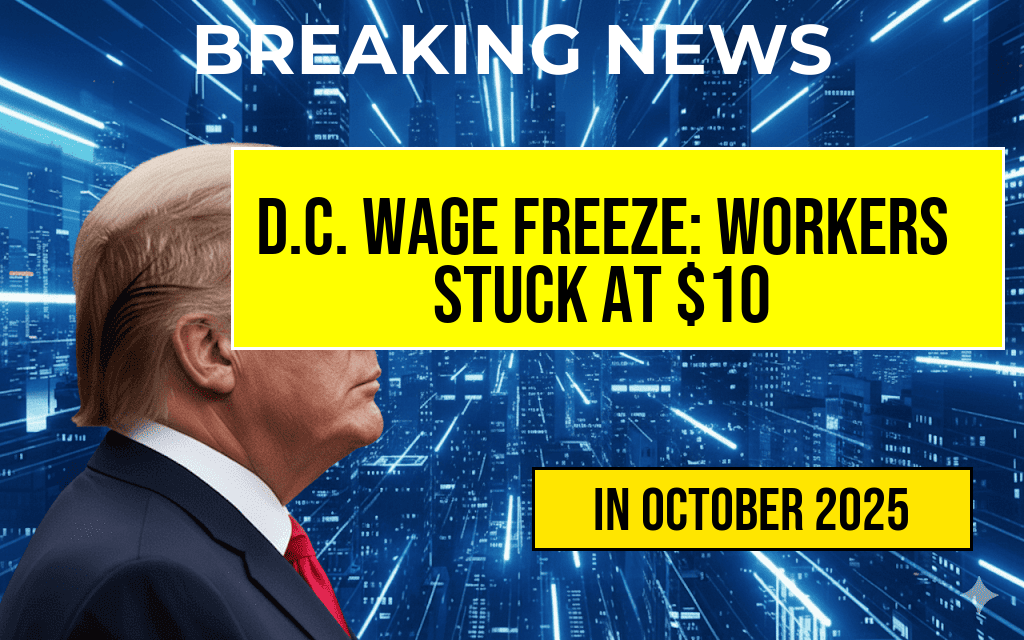In Washington, D.C., restaurant workers are feeling the financial squeeze as a wage freeze keeps their earnings stagnant at $10 per hour, significantly below the city’s current minimum wage of $12. This disparity translates into an alarming loss of approximately $4,160 annually for employees reliant on these wages. The freeze, which has been in place for several years, affects thousands of service workers who are now struggling to make ends meet amid rising living costs. Advocates argue that such a wage stagnation not only undermines the livelihoods of these workers but also poses a broader economic challenge for the city as it grapples with income inequality and workforce retention.
Current Wage Conditions in D.C.
The current minimum wage in Washington, D.C., is set at $15 per hour. However, tipped workers, which include a significant portion of the restaurant workforce, are subject to a different wage structure. The tipped minimum wage remains at $10, leaving many workers reliant on tips to supplement their income. As a result, these employees often work long hours to achieve a living wage, yet many still find themselves falling short.
Economic Impact on Workers
According to a report by the Restaurant Opportunities Centers United, the wage freeze has led to a significant economic impact on restaurant workers. The organization highlights the following key points:
- Lost Income: With the current wage set at $10, workers miss out on a potential $4,160 compared to those earning the minimum wage.
- Rising Living Costs: Many workers report struggles to afford housing, groceries, and transportation in D.C.’s expensive market.
- Job Retention Issues: The low pay has led to high turnover rates, making it difficult for restaurants to maintain a stable workforce.
Legislative Background
The wage freeze stems from legislative decisions made in previous years, aimed at balancing the interests of the hospitality industry and its workers. While some argue that maintaining a lower tipped wage helps restaurants stay afloat, others believe it perpetuates a cycle of poverty among service workers. The tension between these perspectives has led to ongoing debates at the city council level.
Voices from the Industry
Many restaurant workers are vocal about their plight. Maria Lopez, a server at a popular D.C. eatery, shared her frustration: “I work hard every day, but at the end of the month, I still struggle to pay my bills. It feels like we are being overlooked by the very people who should be supporting us.” Her story is echoed by numerous colleagues who face similar challenges.
Potential Solutions
In response to these concerns, various advocacy groups are pushing for legislative changes to raise the tipped minimum wage and implement stronger protections for workers. Here are some proposed solutions:
- Increase the Tipped Minimum Wage: Advocates are calling for an increase in the tipped wage to align more closely with the general minimum wage.
- Implement Wage Transparency: Encouraging restaurants to disclose wage structures and tipping practices could help workers understand and negotiate their earnings better.
- Support for Workers’ Rights: Enhancing protections against wage theft and ensuring fair treatment in the workplace can empower workers.
Community Response and Support
Community organizations, such as the Restaurant Opportunities Centers United, are actively engaging in efforts to raise awareness and support for restaurant workers. These organizations provide resources, training, and advocacy to help workers navigate their rights and improve their economic conditions.
Looking Ahead
The future of restaurant workers in D.C. remains uncertain as legislative discussions continue. With the cost of living on the rise and wages stagnating, the pressure is mounting for lawmakers to take action. Workers and advocates alike are hopeful that their voices will be heard and that meaningful change will come to support those who serve the city’s dining establishments.
As the city navigates these challenges, the need for a balanced approach that considers both the viability of the restaurant industry and the welfare of its workers is essential. The outcome of these discussions will undoubtedly impact the livelihoods of many and the overall health of D.C.’s economy.
Frequently Asked Questions
What is the current minimum wage for restaurant workers in D.C.?
The current minimum wage for restaurant workers in D.C. is $10 per hour, which is significantly lower than the standard minimum wage of $12 per hour.
How much are restaurant workers losing annually due to the wage freeze?
Restaurant workers are losing approximately $4,160 annually compared to what they would earn if the minimum wage were set at $12 per hour.
Why is there a wage freeze for restaurant workers in D.C.?
The wage freeze for restaurant workers is a result of legislative decisions that have not adjusted their pay in line with the regular minimum wage increases, affecting their overall earnings.
What impact does the wage freeze have on the livelihood of restaurant workers?
The wage freeze has a detrimental impact on the livelihood of restaurant workers, as they are unable to earn a living wage, which affects their ability to meet basic needs and financial stability.
Are there any efforts being made to change the wage situation for restaurant workers in D.C.?
There are ongoing discussions and advocacy efforts aimed at addressing the wage situation for restaurant workers in D.C., with hopes to lift the wage freeze and ensure fair compensation.






